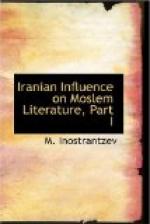Since, barring the small book treating of Ardeshir’s adventures, no original Pahlavi document in the domain of historical or romantic literature has descended to us and even the Arabic recensions made directly from the original general history in Pahlavi have perished, we are altogether left in uncertainty touching many most important points. We cannot, for instance, ascertain whether alongside of the Khoday-Nameh there existed also other general continuous narrations or whether the deviations, which are for the most part trifling, in some cases of great moment, already existed in the Pahlavi work or are traceable to various recensions of that book. It would not be rash, to assume that some copies of the work contained additional matter taken from other Pahlavi books like the Romance of Bahram. Bahram the high priest of the city of Shapur collected, according to Hamza, more than 20 manuscripts of the Khoday-Nameh and from their divergence made out another independent recension. Musa Ibn Isa Kesravi complains of the variants in the copies of the work; the latter author who speaks of defects in translation has in view only the Arabic redactions. The text, however, of Tabari, at all events and more so a comparison of Tabari and other Arabs with one another and with Firdausi exhibits that entire sections of the History of Kings were already in the Pahlavi original in essentially different shapes. Otherwise, it would not be possible, for instance, that where Tabari offers two different versions, one should harmonise with Eutychius and Ibn Kotaiba (derived from the translation of Ibn Mukaffa) and the other should agree with the Arab Yakubi and often with Firdausi, who goes back to the Pahlavi text not directly but mediately through compositions in modern Persian. It is very important for a knowledge of the history that thus we have at our command all manner of dissonant reports about the Sasanide epoch. But we have to observe all the same that the character and the tendency of the several versions are almost all along consistent and further more that often we have more recensions than one which differ but little and which have one and the same ground-work or prototype. The question whether this difference is older or younger than the Khoday-Nameh has more literary than historical significance.
[Sidenote: Translation of Khoday-Nameh into Arabic. Its general fidelity to the original.]
[Sidenote: The Arabic translation may be pieced together from various sources.]
We should decide all this with much more certainty did we possess but one direct rendering made from the Pahlavi into Arabic. Above all we have to deplore the loss of Ibn Mukaffa’s history of Persian Kings which is always assigned the first place among translations of the Persian Book of Kings by Hamza and other authorities. This distinguished man who only late in life exchanged the faith of his forbears for that of Islam, and who never professed




